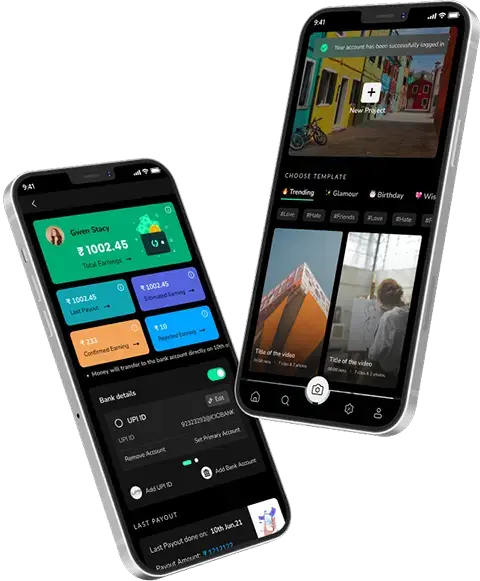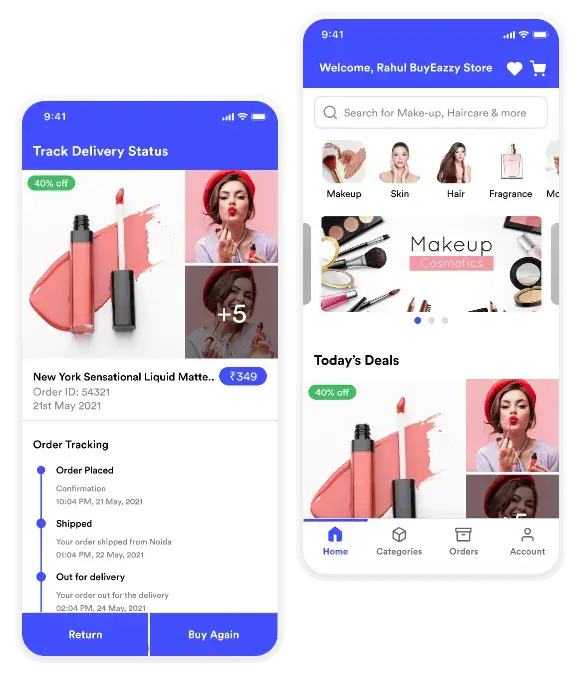22 Dec 2022
Updated on January 10th, 2023
Why is PHP Web Development Famous Among Developers: Benefits of Using It!
Shivani Singh

PHP is a popular open-source scripting language developers use for web application development. It was originally a name for “personal homepage,” but PHP is now a recursive acronym for “hypertext processor,” although it’s unlikely you’ll ever hear that name again.
PHP is a server-side scripting language that deploys in HTML in a seamless form. PHP allows web developers to create dynamic content and interact with databases. Moreover, it has been the best pick of developers want to make the most of web development. The reasons are its simplicity, speed, and flexibility.
What is PHP?
Before you dive into the entire section, take a moment to review PHP basics.
Rasmus Lerdorf developed PHP in 1994 as an open-source server-side scripting language. Although the initial acronym stood for “personal homepage,” it was quickly adopted by many and given the new name Hypertext processor.
Lerdorf created the language to be intuitive and straightforward to use. This makes it easy for users to extract, display and store relevant data on a website. In addition, PHP has many extensions that simplify the integration and development process. Therefore, the development community is vital. The version of PHP (8.1.5) was released on April 14, 2022.
So how do businesses create solid web design while turning server-side PHP code? These are several sites that use PHP well. You can get a better insight while moving to the rest of the section.
What is PHP? Learn More!
PHP, like any other scripting language, is fundamentally a tool that you use to connect with your database to obtain information and then hand that information to your web server for display in HTML. PHP is unique in many ways:
- A scripting language: Scripting languages can be interpreted at runtime by another program (no compilation required). Scripting languages are interpreted client-side or server-side (in a browser).
- Server-Side PHP: PHP is a server-side scripting language processed by a PHP interpreter running on a web server. The result (the output) is sent to the browser as plain HTML.
- PHP is open-source: PHP can be downloaded and used at no cost.
- Object-Oriented Programming: ObjectOriented Programming (OOP), which uses objects to store data and functions, allows you to build more complex, reusable web apps. OOP was introduced to PHP5.
- PHP is fast because it uses its memory. This reduces server workload and increases performance. PHP can run up to 382 percent faster than Python and 195% faster than Ruby.
- Simple: PHP syntax is easy to understand and learn, regardless of whether you are building from scratch or using existing frameworks or add-ons.
- PHP is well supported: PHP supports all major databases (MySQL and SQLite, ODBC), and it is compatible with most servers (Apache and IIS). It can be used on all platforms (Windows OS, Mac OS, Linux) and is supported by PHP frameworks, Symfony, CodeIgniter, and other well-stocked and vetted libraries.
PHP is a loosely typed language that uses eight data classes to construct variables (which can store data of different types). PHP is more relaxed than other programming languages regarding variables, evaluating, and guessing data types. To start, you must identify all variables with a dollar sign ($), but any name that begins with a letter can be used.
PHP variables are not like other programming languages. They can be either “strong” or “weak” and indicate how strict or lose the conversion is. Now that you have learned its efficiency, it’s time to connect with the best PHP development company that lets you build your own dynamic webpage.
Also Read:The Stages for iOS App Development: From Ideation to Launch!
Why is PHP Web Development Mostly Used?
- Easy to learn and use. You can use a single PHP file to create a website. Even if you have not gained any previous web development experience, it is easy for anyone to do so. PHP is more superficial than many languages because it has a simple syntax and commands that are easy to understand.
- Open-source (and therefore free!) It is also easy to install and can be used quickly. Open access is available to many PHP frameworks, such as Laravel, Symfony, and Symfony. This feature is attractive to various PHP development companies because it allows them to control their web development costs.
- Gives Control: GPHP gives the web developer more control, and it is easier to use than other languages. PHP is unlike other programming languages, where it is easier to override long and complicated documents. Website builders can use HTML tags to add or mix HTML tags, giving content authority. PHP allows developers to place codes anywhere they want, even between tags. As long as the tags are marked, developers can write functions and systems in random order.
- Seamless Integration: PHP integrates quickly with all applications, ensuring consistency and easy integration. It runs smoothly on a variety of platforms, including UNIX and Solaris. It can be easily integrated with other technologies, such as Java, and does not require updating existing software. This saves money and time.
- Flexible: PHP is one of the most flexible web programming languages. Programmers can also modify the code during various stages of web development. For example, they can add new functionality or features to the website after they have written the code. Likewise, you can make changes to your code and tweak the code to add new features to your website.
- Compatible with CMSs: The advantage of PHP programming language for web development is its widespread use in many content management systems. PHP is the foundation for many popular CMSs (content management systems) such as Joomla, Drupal, and PrestaShop. You can work with many CMSs if PHP is chosen as your primary technology for your PHP website design project. You can create highly customizable websites using a PHP-based content management platform.
- Cost-effectiveness: The PHP programming language is also famous for web developers because it is free. Web developers do not have to pay licensing fees to reap the benefits of a programming language. You can freely access the source code for PHP programming language under a General Public License. However, the international community helps to improve its functionality. There are many PHP-based web solutions. The practical use is well-tested. This is why it is easy to enhance language functionality.
- Reduced Development Time: PHP is an object-oriented programming language you can reuse for any other website development task. Developers can save time by using PHP scripting codes as they have a broad range of PHP frameworks for web development, including Symfony and WordPress. Each PHP framework offers different functions that make website development easy and secure. It also has powerful built-in features that make it easy to retrieve HTML.
- Retain Customers: The website’s loading speed is crucial in today’s digitalized, fast-moving world. The attention span of humans is 6-8 seconds. However, they will switch to another website if it loads within that time. PHP-built websites allow for faster data processing and turnaround time for Google users. PHP web development was created for dynamic web pages that will continue to run for a long time. PHP scripts are faster than any other programming language at solving web development problems. PHP code can be embedded in HTML and can be transformed into dynamic website code without much effort. This is done by simply incorporating PHP code into HTML. This outstanding feature makes PHP a modern language for creating elegant, function-rich websites compatible with HTML coding.
- Scalability: Numerous websites with high traffic have used PHP recently. Developers all over the globe use PHP to create a variety of websites and web apps. Programmers can create simple websites by embedding PHP code in HTML. You can also use the resources and tools offered by various PHP frameworks to create large or complex web applications in a shorter time frame.
Fortunately, we are the top PHP web development company that provides value to your product.
Also Read: These Fonts For Programming Can Change The Coding Future
Examples of Leading Websites Built with PHP
WordPress
The blog and CMS is written in PHP. Therefore, it can be paired with MySQL or MariaDB database tools to store and retrieve data. The CMS tool’s PHP code interacts with databases and retrieves vital information. It then displays that information as static HTML elements.
PHP allows users to drag-and-drop UI components and create their own templates by using Leaning into PHP
Tumblr
Tumblr is a regular source of funny memes and strange online content. Although the site’s ownership has changed over the years, one thing that remains constant is its use of PHP. Tumblr has been helping users navigate their favorite content better and keeping them informed about new internet topics for six years.
Return-type declarations and scalar-type hints improve Tumblr’s performance. These hints allow you to specify the types of parameters PHP can accept.
Yahoo
Yahoo began as a PHP-only website that powered its Mail, Answers, News, and News segments. After that, Yahoo moved to a mixed programming framework to compete with Google. However, PHP gave Yahoo its strong start in the market.
Although transitions to other types of code are ongoing, PHP helped Yahoo create strong account security, user-friendly template designs, and reliable policy frameworks.
Spotify
PHP powers Spotify’s cloud music platform. Spotify is one of the most loved music services in the world, thanks to its PHP code.
Spotify used Symfony2 to reduce the time it took to load dynamic elements during their search. This made it faster for them to find their music.
Canva
Canva provides design-ready templates for more than 10,000,000 users around the world. This makes it simple to create unique projects without spending a fortune. Furthermore, Canva uses PHP to streamline the process of template searching and delivery.
Canva was originally built using a PHP-only framework, but it eventually incorporated Node.js to increase its feature set. However, Cavna still uses PHP for its backend work.
Moodle
Moodle is used in thousands of schools throughout the United States to assist students in achieving their academic goals. This learning management system (LMS) was developed using PHP but also uses CSS and JavaScript to provide critical functions.
Robust Tools Used for PHP Web Development
Many PHP tools are on the market today, making it difficult to choose the right one. However, these are the top 10 most popular PHP tools that have caught the eye of web developers.
1. PHP Storm
PHPStorm has the advantage of being lightweight, fast, and easy to use. This PHP IDE is compatible with PHP frameworks such as Symfony and Yii, Laravel, and CakePHP, and popular Content Management Systems (CMS) like Drupal, Magento, and WordPress. The IDE supports live editing for major front-end technologies such as CSS, HTML5, JavaScript, and others. It is also compatible with code refactoring and unit testing, as well as debugging and lets developers integrate with version control systems, remote deployments, composer, command-line tools, rest clients, and other tools.
PHP Storm features:
- Complete the code
- Code re-arranger
- Zero Configuration Debugging
- Native encoding support
- Other languages are PHP, JavaScript, Visual Basic, C, C++, and C#.
- Microsoft Windows, Linux, and Mac OS X are supported platforms.
2. Netbeans
NetBeans is the most popular PHP IDE for PHP app development. It supports multiple languages and has all the rich features you would expect. NetBeans was initially used for Java development. However, the latest version is lighter, faster, and more supportive of PHP app development services. This version is compatible with HTML5, and C++ like programming languages. You can use it to develop large-scale web applications, and it supports a wide range of languages, such as Japanese, English, Brazilian Portuguese, and simplified Chinese. This PHP development tool is open-source and compatible with the most popular PHP frameworks, including Symfony 2, CakePHP2, and FuelPHP. Smarty, WordPress CMS, Zend, Syfony 2 and CakePHP. NetBeans PHP IDE has many features that allow you to develop web applications using the latest PHP.
NetBeans features:
- Code Formatting & folding
- Completion of smart code
- Getter Setter generation
- Use catch code completion
- Syntax Highlighter
- Languages supported are PHP, JavaScript, and HTML5
- Windows, macOS Linux, Solaris, and Solaris
3. Aptana Studio
Aptana Studio is an open-source PHP development tool that integrates with many server-side and client-side web technologies such as PHP, Ruby on Rails, Ruby, HTML5, HTML5, and PHP. It provides a command line interface and debuggers to facilitate the PHP app development. Moreover, it allows PHP programmers to create and test web apps in one environment that supports FTP, SFTP, and IDE customization. This web development engine uses Eclipse’s flexibility and includes details about each element supported by the top web browsers. Aptana Studio, a PHP IDE that is fast and efficient, offers many attractive features that will increase your productivity.
Aptana Studio features:
- Set breakpoints, control execution, inspect variables
- The latest HTML5 specifications supported
- Collaborating with peers through the pull, merge, and push actions
- IDE Customization
- Git Integration and Built-in terminal
- PHP, JavaScript, and Ajax. HTML and Ruby on Rails are supported language
- Windows, Linux, and Mac OS X.
4. Zend Studio
Zend Studio is a PHP development IDE. It offers an exciting range of features and can be deployed to any server, even those in the cloud. In addition, it is optimized for PHP 7, making it significantly faster than the previous versions. Zend Studio is an excellent tool for any company.
Zend Studio features:
- Extensive Eclipse plugin capabilities
- You can deploy to the cloud using Amazon AWS and Microsoft Azure
- Zend Server is easy to deploy. Zend Server provides continuous integration and robust security features.
5. XAMPP.org
XAMPP.org is intended for organizations that need a MySQL database solution. It might be too much for startups, depending on the requirements.
XAMPP features:
- It is the oldest platform for PHP development. It combines the experiences of all participating developers over ten years.
- Easy-to-Install (via wizard)
- Part of the Apache family of products
- MySQL and Perl are included in the installation.
- You can install CMS components over XAMPP (via Bitnami).
- All components are easily controlled via a single panel.
6. PHP Debug Bar
Allows you to display profiling data across multiple web applications. There are two parts to the development tool: the main DebugBar, data collectors, and the render.
The data collector architecture is the basis of the development tool. The tool also allows you to save and reopen your requests.
PHP Debug Bar features
- Monitor networks and CSS elements.
- You can make custom collectors and see the collectors in your bar.
- Supports all major programming languages, including Ruby, PHP, Java, and PHP.
- This data collector is available for standard PHP highlights.
- With ease, can handle AJAX requests
- Offers detailed documentation.
7. AWS Cloud9
AWS Cloud9 provides a pre-configured environment that allows developers to start coding immediately. You can also use AWS Cloud 9 to create a serverless application and write, debug and run code from a browser.
Amazon.com’s web services division has created the Integrated Development Environment. The app includes an integrated code editor, debugger, and terminal.
AWS Cloud9 features:
- This program offers real-time analysis of language, an image editor, and a debugger.
- Real-time input tracking and a shared development environment.
- Developers can code together with colleagues using the collaborative coding feature.
- Supported tooling for more than 40 programming languages, including PHP, JavaScript, Python, Node.js, and C++.
- You can access your file revision history to help you see all of the changes you have made.
Also Read: How To Keep Your Data Safe In The Cloud Storage
8. Eclipse
An eclipse is an excellent tool for anyone looking to simplify coding. Moreover, the tool is compatible with both GUI and non-GUI applications. This tool supports both Java and PHP environments.
Eclipse features:
- Code templates, code assistance, formatting, navigation, and syntax highlighting are available. This feature allows you to create better code.
- All the most popular programming languages, including JavaScript, COBOL Ruby, C++, and Python, are supported.
- Automatic completion saves you a lot of time.
- There are many plugins, including unit testing and code formatting plugins.
- Multilingual support is also available.
- The interface is user friendly.
- Provides extensive documentation and a community.
9. Sublime Text
Sublime Text is one of the most known text editors for PHP developers. It is not an IDE by itself. However, you can make Sublime Text a good editor for creating PHP applications by installing specific plugins/packages. Cross-platform support for multiple programming and markup languages is possible with this cross-platform editor. It is widely considered the best IDE for PHP programming because of its rich functionalities and unique designs. It is a leading customizable editor that uses key shortcuts to navigate between symbols, words, and lines. You can also make any changes to your code.
Sublime Text features:
- Split Editing
- Instant Project Switch
- More effective command palettes
- Distraction-free mode
- API for Plugin
- Windows, Mac OS, and Linux
10. NuSphere PhpED
NuSphere offers PhpED, a proprietary integrating PHP development platform with an advanced PHP editor, profiler, PHP debugger, and database client & insight. The utility gives developers a variety of tools and tweaks to make web development easier. PhpEd, a commercial PHP accelerator, speeds up the development of applications. This IDE is an excellent choice for developing complex websites and web apps. It supports JavaScript, HTML, and CSS3, as well as PHP 7.1. PhpED lets developers work with the most popular PHP frameworks, such as Zend, Yii, Laravel, and Zend.
PhpED features:
- PhpExpress helps you accelerate PHP apps
- Composite file extensions supported
- Parallel Debugging
- Integration with PHPUnit
- Refactoring PHP code
- PHP HTML, XML CSS, CSS, Perl, Python, and JavaScript are supported languages
- Windows, Web, Mac, Linux, and iPad are supported platforms.
Connect with Our Experts Today!
PHP is a well-known web technology used in many web solutions, such as simple websites, eCommerce stores, and web applications.
Are you looking for a web platform that is well-designed and built using the PHP programming language? Our PHP experts are happy to help you realize your ideas.
So, schedule a meeting today with Techugo. Also, keep following us for more innovative updates.
Get in touch.
Write Us
sales@techugo.comOr fill this form



 SA
SA  KW
KW  IE
IE AU
AU UAE
UAE UK
UK USA
USA  CA
CA DE
DE  QA
QA ZA
ZA  BH
BH NL
NL  MU
MU FR
FR 













